Shiqian Ma
Total Variation Rates for Riemannian Flow Matching
Feb 05, 2026Abstract:Riemannian flow matching (RFM) extends flow-based generative modeling to data supported on manifolds by learning a time-dependent tangent vector field whose flow-ODE transports a simple base distribution to the data law. We develop a nonasymptotic Total Variation (TV) convergence analysis for RFM samplers that use a learned vector field together with Euler discretization on manifolds. Our key technical ingredient is a differential inequality governing the evolution of TV between two manifold ODE flows, which expresses the time-derivative of TV through the divergence of the vector-field mismatch and the score of the reference flow; controlling these terms requires establishing new bounds that explicitly account for parallel transport and curvature. Under smoothness assumptions on the population flow-matching field and either uniform (compact manifolds) or mean-square (Hadamard manifolds) approximation guarantees for the learned field, we obtain explicit bounds of the form $\mathrm{TV}\le C_{\mathrm{Lip}}\,h + C_{\varepsilon}\,\varepsilon$ (with an additional higher-order $\varepsilon^2$ term on compact manifolds), cleanly separating numerical discretization and learning errors. Here, $h$ is the step-size and $\varepsilon$ is the target accuracy. Instantiations yield \emph{explicit} polynomial iteration complexities on the hypersphere $S^d$, and on the SPD$(n)$ manifolds under mild moment conditions.
Bregman Douglas-Rachford Splitting Method
Sep 10, 2025Abstract:In this paper, we propose the Bregman Douglas-Rachford splitting (BDRS) method and its variant Bregman Peaceman-Rachford splitting method for solving maximal monotone inclusion problem. We show that BDRS is equivalent to a Bregman alternating direction method of multipliers (ADMM) when applied to the dual of the problem. A special case of the Bregman ADMM is an alternating direction version of the exponential multiplier method. To the best of our knowledge, algorithms proposed in this paper are new to the literature. We also discuss how to use our algorithms to solve the discrete optimal transport (OT) problem. We prove the convergence of the algorithms under certain assumptions, though we point out that one assumption does not apply to the OT problem.
ASGO: Adaptive Structured Gradient Optimization
Mar 26, 2025


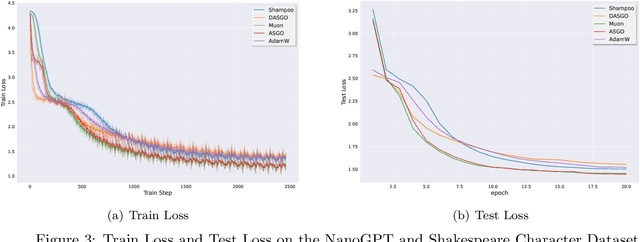
Abstract:Training deep neural networks (DNNs) is a structured optimization problem, because the parameters are naturally represented by matrices and tensors rather than simple vectors. Under this structural representation, it has been widely observed that gradients are low-rank and Hessians are approximately block-wise diagonal. These structured properties are crucial for designing efficient optimization algorithms but may not be utilized by current popular optimizers like Adam. In this paper, we present a novel optimization algorithm ASGO that capitalizes on these properties by employing a preconditioner that is adaptively updated using structured gradients. By fine-grained theoretical analysis, ASGO is proven to achieve superior convergence rates compared to existing structured gradient methods. Based on the convergence theory, we further demonstrate that ASGO can benefit from the low-rank and block-wise diagonal properties. We also discuss practical modifications of ASGO and empirically verify the effectiveness of the algorithm on language model tasks.
Riemannian Proximal Sampler for High-accuracy Sampling on Manifolds
Feb 11, 2025Abstract:We introduce the Riemannian Proximal Sampler, a method for sampling from densities defined on Riemannian manifolds. The performance of this sampler critically depends on two key oracles: the Manifold Brownian Increments (MBI) oracle and the Riemannian Heat-kernel (RHK) oracle. We establish high-accuracy sampling guarantees for the Riemannian Proximal Sampler, showing that generating samples with $\varepsilon$-accuracy requires $O(\log(1/\varepsilon))$ iterations in Kullback-Leibler divergence assuming access to exact oracles and $O(\log^2(1/\varepsilon))$ iterations in the total variation metric assuming access to sufficiently accurate inexact oracles. Furthermore, we present practical implementations of these oracles by leveraging heat-kernel truncation and Varadhan's asymptotics. In the latter case, we interpret the Riemannian Proximal Sampler as a discretization of the entropy-regularized Riemannian Proximal Point Method on the associated Wasserstein space. We provide preliminary numerical results that illustrate the effectiveness of the proposed methodology.
Fully First-Order Methods for Decentralized Bilevel Optimization
Oct 25, 2024Abstract:This paper focuses on decentralized stochastic bilevel optimization (DSBO) where agents only communicate with their neighbors. We propose Decentralized Stochastic Gradient Descent and Ascent with Gradient Tracking (DSGDA-GT), a novel algorithm that only requires first-order oracles that are much cheaper than second-order oracles widely adopted in existing works. We further provide a finite-time convergence analysis showing that for $n$ agents collaboratively solving the DSBO problem, the sample complexity of finding an $\epsilon$-stationary point in our algorithm is $\mathcal{O}(n^{-1}\epsilon^{-7})$, which matches the currently best-known results of the single-agent counterpart with linear speedup. The numerical experiments demonstrate both the communication and training efficiency of our algorithm.
Single-Timescale Multi-Sequence Stochastic Approximation Without Fixed Point Smoothness: Theories and Applications
Oct 17, 2024Abstract:Stochastic approximation (SA) that involves multiple coupled sequences, known as multiple-sequence SA (MSSA), finds diverse applications in the fields of signal processing and machine learning. However, existing theoretical understandings {of} MSSA are limited: the multi-timescale analysis implies a slow convergence rate, whereas the single-timescale analysis relies on a stringent fixed point smoothness assumption. This paper establishes tighter single-timescale analysis for MSSA, without assuming smoothness of the fixed points. Our theoretical findings reveal that, when all involved operators are strongly monotone, MSSA converges at a rate of $\tilde{\mathcal{O}}(K^{-1})$, where $K$ denotes the total number of iterations. In addition, when all involved operators are strongly monotone except for the main one, MSSA converges at a rate of $\mathcal{O}(K^{-\frac{1}{2}})$. These theoretical findings align with those established for single-sequence SA. Applying these theoretical findings to bilevel optimization and communication-efficient distributed learning offers relaxed assumptions and/or simpler algorithms with performance guarantees, as validated by numerical experiments.
Tuning-Free Bilevel Optimization: New Algorithms and Convergence Analysis
Oct 07, 2024



Abstract:Bilevel optimization has recently attracted considerable attention due to its abundant applications in machine learning problems. However, existing methods rely on prior knowledge of problem parameters to determine stepsizes, resulting in significant effort in tuning stepsizes when these parameters are unknown. In this paper, we propose two novel tuning-free algorithms, D-TFBO and S-TFBO. D-TFBO employs a double-loop structure with stepsizes adaptively adjusted by the "inverse of cumulative gradient norms" strategy. S-TFBO features a simpler fully single-loop structure that updates three variables simultaneously with a theory-motivated joint design of adaptive stepsizes for all variables. We provide a comprehensive convergence analysis for both algorithms and show that D-TFBO and S-TFBO respectively require $O(\frac{1}{\epsilon})$ and $O(\frac{1}{\epsilon}\log^4(\frac{1}{\epsilon}))$ iterations to find an $\epsilon$-accurate stationary point, (nearly) matching their well-tuned counterparts using the information of problem parameters. Experiments on various problems show that our methods achieve performance comparable to existing well-tuned approaches, while being more robust to the selection of initial stepsizes. To the best of our knowledge, our methods are the first to completely eliminate the need for stepsize tuning, while achieving theoretical guarantees.
Decentralized and Equitable Optimal Transport
Mar 12, 2024

Abstract:This paper considers the decentralized (discrete) optimal transport (D-OT) problem. In this setting, a network of agents seeks to design a transportation plan jointly, where the cost function is the sum of privately held costs for each agent. We reformulate the D-OT problem as a constraint-coupled optimization problem and propose a single-loop decentralized algorithm with an iteration complexity of O(1/{\epsilon}) that matches existing centralized first-order approaches. Moreover, we propose the decentralized equitable optimal transport (DE-OT) problem. In DE-OT, in addition to cooperatively designing a transportation plan that minimizes transportation costs, agents seek to ensure equity in their individual costs. The iteration complexity of the proposed method to solve DE-OT is also O(1/{\epsilon}). This rate improves existing centralized algorithms, where the best iteration complexity obtained is O(1/{\epsilon}^2).
A Single-Loop Algorithm for Decentralized Bilevel Optimization
Nov 15, 2023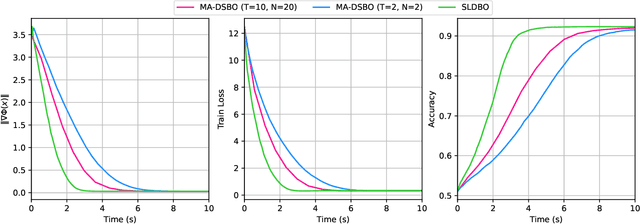
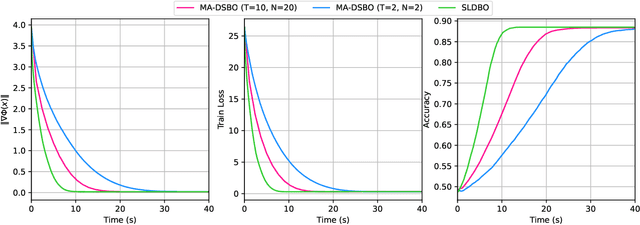
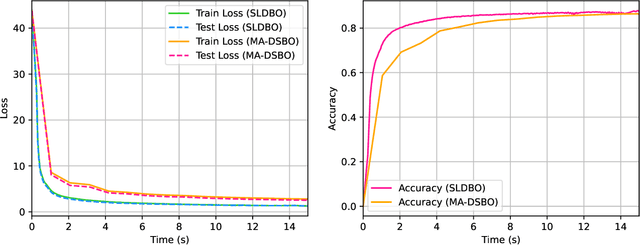
Abstract:Bilevel optimization has received more and more attention recently due to its wide applications in machine learning. In this paper, we consider bilevel optimization in decentralized networks. In particular, we propose a novel single-loop algorithm for solving decentralized bilevel optimization with strongly convex lower level problem. Our algorithm is fully single-loop and does not require heavy matrix-vector multiplications when approximating the hypergradient. Moreover, unlike existing methods for decentralized bilevel optimization and federated bilevel optimization, our algorithm does not require any gradient heterogeneity assumption. Our analysis shows that the proposed algorithm achieves the best known convergence rate for bilevel optimization algorithms.
Zeroth-order Riemannian Averaging Stochastic Approximation Algorithms
Sep 25, 2023
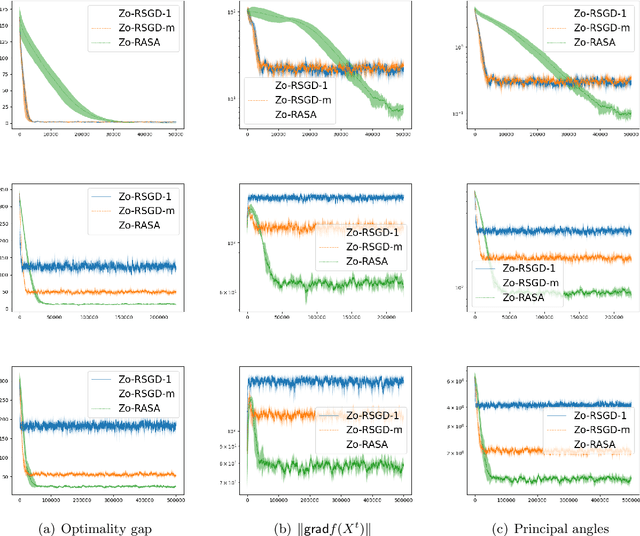
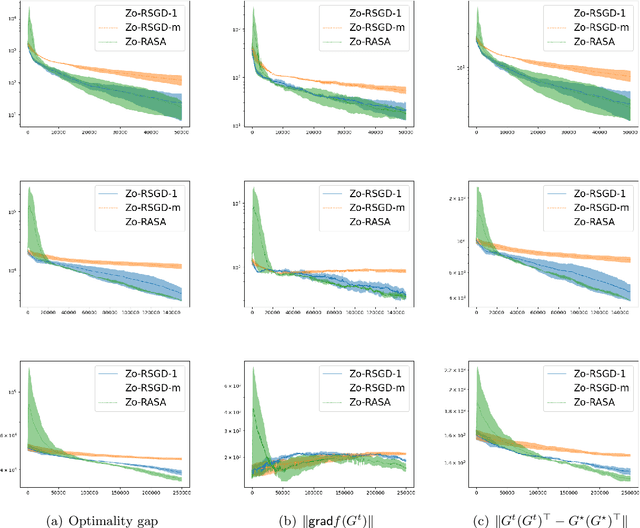
Abstract:We present Zeroth-order Riemannian Averaging Stochastic Approximation (\texttt{Zo-RASA}) algorithms for stochastic optimization on Riemannian manifolds. We show that \texttt{Zo-RASA} achieves optimal sample complexities for generating $\epsilon$-approximation first-order stationary solutions using only one-sample or constant-order batches in each iteration. Our approach employs Riemannian moving-average stochastic gradient estimators, and a novel Riemannian-Lyapunov analysis technique for convergence analysis. We improve the algorithm's practicality by using retractions and vector transport, instead of exponential mappings and parallel transports, thereby reducing per-iteration complexity. Additionally, we introduce a novel geometric condition, satisfied by manifolds with bounded second fundamental form, which enables new error bounds for approximating parallel transport with vector transport.
 Add to Chrome
Add to Chrome Add to Firefox
Add to Firefox Add to Edge
Add to Edge